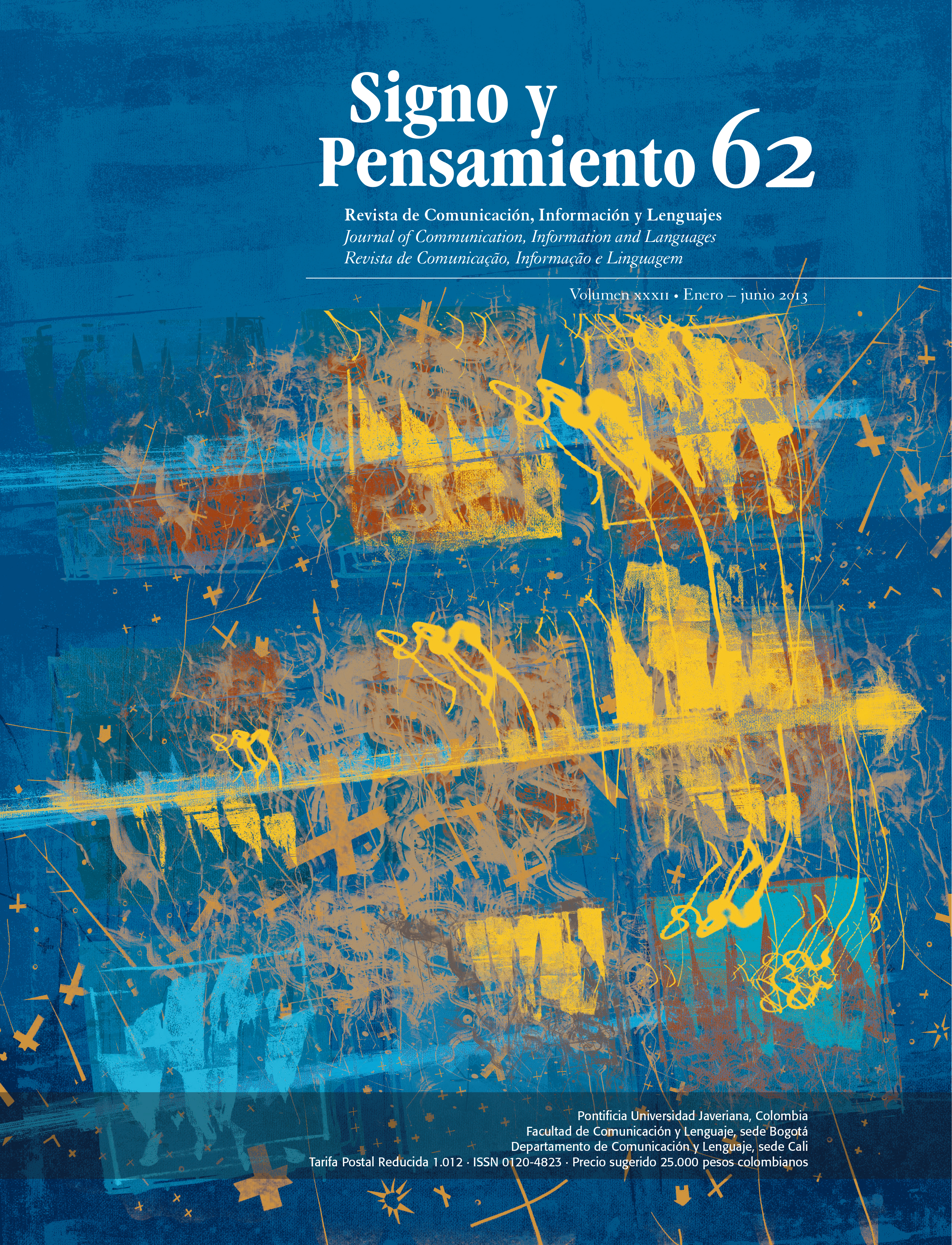Abstract
This article aims to describe the general characteristics of TV advertising in the Colombian Centre Region, and in particular, the tactics and strategies by which it seeks to interpellate the consumer. Both tasks are intended to support the hypothesis according to which the advertising, rather than manipulatng, misleading or inducing the indiscriminate consumption of goods and services, proposes a game to the consumer through its narrative. In turn, the consumer decides whether or not to participate, by submitting to a set of rules of this game
Casetti, F. (1994). Modelos comunicativos de la publicidad. Questiones publicitarias 2 (1), 22-33.
Contursi, M. E. & Ferro, F. (2000). La narración. Usos y teorías. Colombia: Editorial Norma.
De Certau, M. (1986) Usos y tácticas de la cultura ordinaria. Signo y Pensamiento 5 (9), 59-71.
Guyot, J. (1994) El paradigma publicitario, parangón de la modernidad. Comunicación y Sociedad, 21, 51-95.
Horkheimer, M. & Adorno W. T. (1998). Dialéctica del iluminismo. Buenos Aires: Editorial Sudamericana.
Imbert, G. (2003). El zoo visual. De la televisión espectacular a la televisión especular. España: Editorial Gedisa.
Jenkins, H. (2008). Convergence culture. La cultura de la convergencia de los medios de comunicación. Buenos Aires: Editorial Paidós.
Lipovetsky, G. (1994). El imperio de lo efímero. La moda y su destino en las sociedades modernas. España: Anagramas.
Ramonet, I. (abril de 2002). La fábrica de los deseos. Le Monde Diplomatique, edición en español, 22-23.
Reyes Trigos, C. (2003). Visión panorámica de los estudios sobre la narración. Revista de Humanidades del Instituto Tecnológico de Monterrey, (15), 95-119.
Rincón, O. (2006). Narrativas mediáticas, o como se cuenta la sociedad del entretenimiento. España: Editorial Gedisa.
Thompson, J. (1998). Los media y la modernidad. Una teoría de los medios de comunicación. España: Paidós.
Villadiego Prins, M. (2011) Tácticas y estrategias del relato publicitario para la construcción de un sentido de la modernidad en Colombia. En Tarcitano, P.R. & Moraes, E. (Eds.) Publicidad No plural (pp.91-96). (E.Book). Brasil: Universidad Metodista.
Villadiego Prins, M. Narrativas para implicar al consumidor. Análisis de las narrativas publicitarias televisivas. En Memorias del II Encuentro de la Red Latinoamericana de investigadores de la publicidad, RELAIP. Cali, Colombia, 8 de junio de 2012. Universidad Autónoma de Occidente.
Williams, R. (1997) Mundos de ensueños del consumo. En Crowley, D. & Heyer P. (eds.) La comunicación en la historia. Tecnología, cultura y sociedad, (pp.235-241). España: Editorial Bosch.
This journal is registered under a Creative Commons Attribution 4.0 International Public License. Thus, this work may be reproduced, distributed, and publicly shared in digital format, as long as the names of the authors and Pontificia Universidad Javeriana are acknowledged. Others are allowed to quote, adapt, transform, auto-archive, republish, and create based on this material, for any purpose (even commercial ones), provided the authorship is duly acknowledged, a link to the original work is provided, and it is specified if changes have been made. Pontificia Universidad Javeriana does not hold the rights of published works and the authors are solely responsible for the contents of their works; they keep the moral, intellectual, privacy, and publicity rights.
Approving the intervention of the work (review, copy-editing, translation, layout) and the following outreach, are granted through an use license and not through an assignment of rights. This means the journal and Pontificia Universidad Javeriana cannot be held responsible for any ethical malpractice by the authors. As a consequence of the protection granted by the use license, the journal is not required to publish recantations or modify information already published, unless the errata stems from the editorial management process. Publishing contents in this journal does not generate royalties for contributors.


